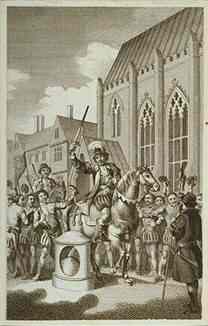Unit Six Section D

 |
by Robert Burns The lyric poems of Robert Burns celebrate love and nature. Many of his folk songs, including "Auld Lang Syne, " are still sung today. As you read this poem, look for its musical qualities. O my love's like a red, red rose, O my love's like the melodie As fair art thou, my bonie lass, And I will love thee still, my dear, Till a' the seas gang dry, my dear, I will luve thee still my dear, And fare thee weel, my only love, And I will come again, my love, |
1. To what two things does the speaker compare love in the first stanza? |
Epigrams reached the peak of their popularity during the eighteenth century. What point does Alexander Pope make in this humorous statement to a "blockhead"?
You beat your pate, and trust that wit will come: |
1. What type of person might the speaker be addressing in this epigram? |
Alexander Pope was a master of epigrams. What ideas does Pope express with these witty statements? Does the advice in each one still apply today?
Tis education forms the common mind:
For fools rush in where angels fear to tread.
Be not the first by whom the new are tried,
Hope springs eternal in the human breast;
All nature is but art, unknown to thee;
A wit's a feather, and a chief a rod;
A little learning is a dangerous thing;
Know then thyself, presume not God to scan;
To err is human, to forgive, divine. |
1. in epigram 1, why does Pope say that education is so important? |
Many of William Blake's poems reflect the secret inner thoughts of people. As you read this poem, look for the "thought" that is often too difficult to speak aloud.
Thy friendship oft has made my heart to ache: |
1. How has his friendship with Hayley often caused the speaker to feel? What types of things may have caused this feeling? |
Human realtionships are often difficult. These relationships can be easily poisoned. What does the speaker of the poem think is the most destructive “poison”?
I was angry with my friend;
And I waterd it in fears,
And it grew both day and night.
And into my garden stole, |
1. How did the speaker deal with his anger toward his friend? |
Is it sometimes better to keep feelings of love to ourselves? Would the speaker in this poem have been better off by saying nothing? Never seek to tell thy love, For the gentle wind doth move I told my love, I told my love, Trembling, cold, in ghastly fears. Soon after she was gone from me, Silently, invisibly: |
1. What advice does the speaker give in the first stanza? What is "Love that never told can be"? |
The simplest things in life sometimes provide the most wonder. What can a person miss by taking nature for granted?
To see a world in a grain of sand |
1. What does the speaker say can be seen "in a grain of sand"? |